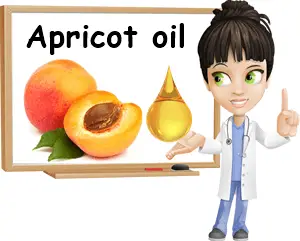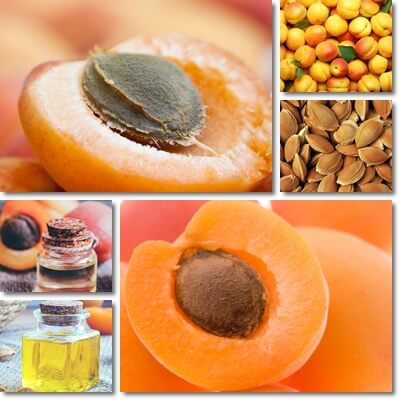Apricot oil is actually apricot kernel oil, a cold-pressed carrier oil made from the kernels of apricot seeds. Apricot oil is known for its benefits for hair and skin in particular, thanks to its moisturizing and nourishing properties and antioxidant and anti-aging effects. Like most carrier oils, apricot too is rich in mono and poly-unsaturated fats such as oleic, linoleic and alpha-linolenic fatty acids, and a source of vitamin E.
While its uses are primarily cosmetic, for hair and skin care and as a carrier oil for essential oils in massage therapy, there is also a food-grade apricot oil that can be used as a cooking oil.
What is apricot oil?
Apricot oil is, in fact, apricot kernel oil. That is, the oil extracted from the milky white kernels of apricot seeds or stones. It is a cold-pressed oil, meaning no damaging heat is used during the extraction process, which helps preserve the natural properties of the fatty acids and vitamins in the oil intact.
The kernels are pressed to release the oil in them, but additional processing may take place. For example, the oil may be filtered to eliminate impurities, and further processed to remove the cyanogenic glycoside known as amygdalin from it. Amygdalin is a toxic compound occurring naturally in apricot kernels, but also peach, cherry plum, plum and apple kernels and their oils.

Types of apricot oil
There are actually 3 types of apricot oil: apricot oil for cosmetic use, food-grade apricot oil and essential apricot oil. Apricot oil meant for cosmetic use alone may be used for face and skin care in general, hair care, nail care or massage, but is not meant to be eaten. Food-grade apricot oil is perfectly edible and resembles almond or walnut oil in terms of flavor profile.
Both the apricot oil meant for cosmetic use and the food-grade one are carrier oils. Essential apricot oil on the other hand is inedible, toxic-if-ingested and meant strictly for external use, only in diluted form. As opposed to apricot oil for cosmetic use and food-grade apricot oil which are made by cold-pressing apricot kernels, apricot essential oil is extracted from the seed cake (press cake) left over after that initial extraction.
Is apricot oil edible?
Only apricot oil labeled food-grade may be eaten safely, without the risk of toxicity or other side effects. However, it’s best to only use oil that is approved for cooking and labeled food-grade or for internal use, and use it as per the manufacturer’s recommendations on the label. And only get 100% pure, certified organic apricot oil. Apricot oil for cosmetic use may have vitamins, perfume or other ingredients added to it that may render it unsafe to eat.
What does apricot oil taste and smell like?
Apricot oil resembles almond or walnut oil in taste, with delicate nutty flavors. It has little odor, a faint bitter or almond-like scent at most, although some report is has no odor at all. The taste and smell of apricot oil depend on the degree of processing it has undergone. But even the least processed oil has little overall flavor or odor (apricot oil definitely doesn’t smell like apricots, unless it has added perfume). As for the way it looks, unrefined apricot oil has a light amber color, whereas refined apricot oil is slightly paler in color.

Apricot oil nutrition
The vitamin, antioxidant and fatty acids profile of apricot oil are why it’s good for you skin, and include:
- Vitamin E (fat-soluble vitamin with antioxidant, anti-aging, emollient, soothing properties)
- Alpha-linolenic acid, a plant based Omega-3 fatty acid (polyunsaturated fatty acid, antioxidant, anti-inflammatory, cardio-protective, precursor to EPA and DHA Omega-3 forms (albeit poor), brain food)
- Linoleic acid, an Omega-6 fatty acid (polyunsaturated fatty acid, antioxidant, anti-inflammatory, cardio-protective, brain food)
- Oleic acid, an Omega-9 fatty acid (monounsaturated fatty acid, antioxidant, anti-inflammatory, cardio-protective, brain food)
- Saturated fats: palmitic acid, stearic acid (lower content than unsaturated)
- Vitamin A (fat-soluble vitamin with antioxidant, anti-aging, reparative properties)
Apricot oil uses and benefits
- Cooking oil: food-grade apricot oil can be used fresh in salads or for light cooking.
- Aromatherapy and massage therapy, either alone or as a carrier oil for essential oils.
- Hair care: nourishes hair, restores shine, repairs and improves appearance of damaged hair.
- Skin care: moisturizes and combats dry skin, repairs damaged skin, softens skin and soothes irritation and inflammation, exerts antioxidant and anti-aging benefits.
- Making soap at home or in industrial settings.
- Cosmetics: apricot oil is added to cosmetics for its moisturizing, soothing and antioxidant properties. It can also be used as a lip balm, hydrating overnight serum or added to face and body care products.
How to use apricot oil on your face?
- For skin care, you can use it on your face as an overnight anti-wrinkle serum, to hydrate, repair and rejuvenate the skin. You can add it to your face cream or body lotion for extra nutrition and a deep moisturizing action. You can use it on your hands to repair damaged skin and combat dryness, either overnight or during the day. You can use it as lip balm for extremely dry, chapped lips or cracked corners of the mouth. You can apply it to the skin to reduce irritation and soothe. Apricot kernel oil is lightweight and gets absorbed into the skin rather quickly, without leaving a thick greasy finish like some other carrier oils.
Note: Despite the glowing reviews, using apricot kernel oil for face care does not guarantee extraordinary results, no matter how pure the apricot oil, how often you use it or how you use it. So while it’s good for the face, it doesn’t exactly work miracles. Instead, a great skin care routine you follow religiously, whether it includes apricot oil, rosehip oil or some other carrier oil, is bound to produce amazing results, far better than a single product would without the support of a good skin care regimen.
How to use apricot oil for hair
After washing, drying and styling your hair, you can apply a few drops of apricot oil to your ends for extra shine and healthier looking hair. You can use the oil as a deep conditioner, and leave it in your hair for a few hours or overnight, then wash it out.
Apricot oil and vitamin B17
One of the most famous uses of apricot oil is for cancer treatment. Apricot kernels and the oil extracted from them are said to contain a vitamin called vitamin B17 which is supposed to reduce tumor growth and be an effective cancer treatment. However, this so-called vitamin B17 is not a real vitamin, but a toxic compound known as amygdalin, occurring naturally in apricot kernels and kernel oil, plum, peach and cherry plum kernels and apple pips.
Not only does it not hold any benefit for cancer, it’s also proven to be toxic and even fatal. While eating a couple of apricot kernels once in a while does not cause major side effects despite the kernels’ amygdalin content, nor does consuming food-grade apricot oil in normal food amounts because it’s had the amygdalin removed, eating the kernels regularly or more than a few is ill-advised and can cause toxicity and more serious side effects. Apricots seeds or oil are not a treatment for cancer.
